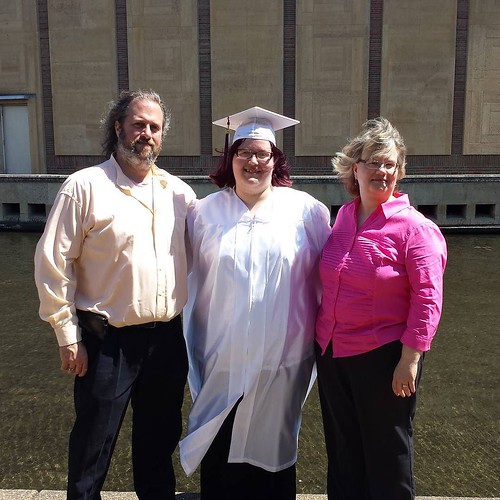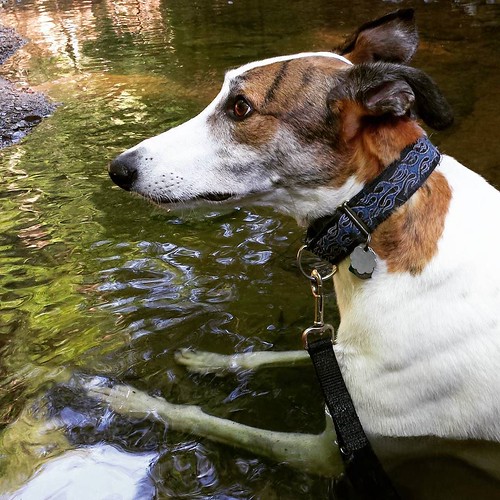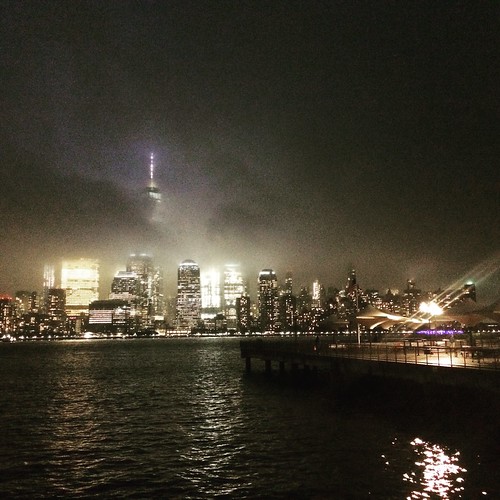Pages on this Blog
▼
Friday, June 30, 2017
Thursday, June 29, 2017
Something for Thursday (Twenty Years of HARRY POTTER edition)
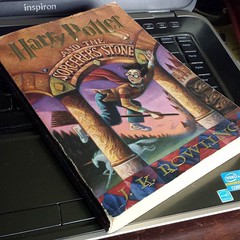
The other day marked the twentieth anniversary of the initial publication of Harry Potter and the Sorcerer's Stone (or Philosopher's Stone, if you live in Britain--and I guess I should link that first since that's where the book came first). I could wax poetic for quite a long post about Harry Potter and the enormous effects on culture those books had, but others have weighed in more intelligently than I could on those points. I, like many others, have had my own "personal journey" with Harry Potter, starting with sometime in what must have been 1999 when I started noticing these books with the unusual cover art and title font on the front displays at Borders, and very prominently placed in the childrens' section. By the time I was aware of the growing Harry Potter phenomenon, there were already three books out, and I bought the first one out of curiosity.
And I loved it, right from the get go--right from the opening paragraph. I mean, that first book's opening paragraph is some seriously wonderful stuff! Don't take my word for it, either: look what this fan did with it:
I never looked back, eagerly snatching up each book as it came out and squeezing it into my reading time. By the release of Deathly Hallows, the last book, I was in as much a fever-pitch as anyone, and I remember a kind of Devil's bargain I made with The Daughter at the time, who was about eight years old: on a Sunday afternoon I told her that she could play videogames for as long as she wanted. Then I went out on the balcony of our apartment and plowed through the last four hundred or so pages of that book.
I've been meaning to reread the Potter books for some time now, and perhaps this winter it will finally be time to do so. (In honesty, I associate the books--as I do most fantasy--with the cooler months. I've never been sure why that is, because fantasy is not an inherently autumnal genre.) I also need to rewatch the movies, which are, for the most part, excellent adaptations and retellings of the story.
One final note: I included a call-back to Harry in Stardancer. How could I not? While the situation involving Lt. Rasharri's revelation to Tariana Osono of her powers isn't so confrontational as when Hagrid tells Harry that he's a wizard, it was hard not to see this moment in my story as a reflection of the earlier one.
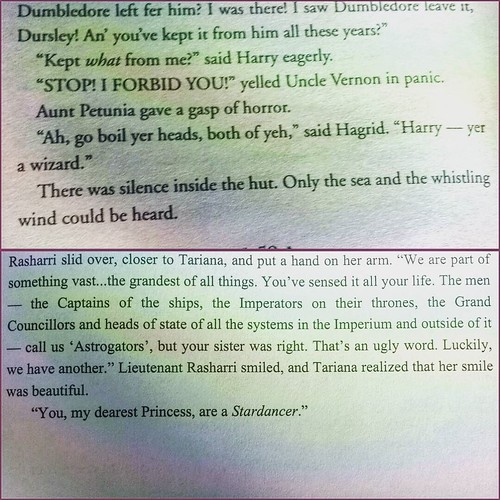
And now, since this is Something for Thursday and all, some music!
Tuesday, June 27, 2017
"I believe in Love" (Thoughts on WONDER WOMAN)
SPOILERS for WONDER WOMAN below. Seriously. I make ZERO effort to not spoil the movie.
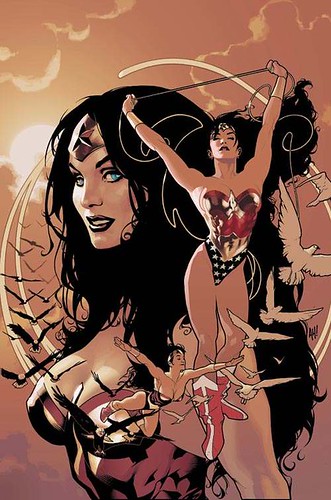
I have always counted Wonder Woman among my favorite superheroes, even though I never read her comics all that much. I wasn't much of a comics reader until I was a teenager, and my main exposure to Wonder Woman as a kid came via the wonderfully fun--if highly campy--teevee show with Linda Carter. When I was seven or eight I bought, with my parents' help, a copy of the Wonder Woman installment in a series of books called the Encyclopedia of Comic Book Heroes. Even though I knew next to nothing about Wonder Woman's lengthy mythology at that point, I still enjoyed thumbing through that book and reading the entries on the various people and villains in Wonder Woman's life and imagining the stories. There are times when reading about stories can be as thrilling to the imagination as reading the stories themselves.
Later, when I became a regular comics reader in the mid-1980s, I didn't read Wonder Woman at all. At that time, DC Comics was in a creative rut and I gravitated toward the exciting and emotional (or downright angsty) Marvel books. Wonder Woman was actually put on a hiatus while DC pulled off a massive reboot of their entire comics universe in an event mega-miniseries (I know, that term makes no sense, deal with it), and after that, Wonder Woman herself received a reboot from Square One in a new series by Len Wein and George Perez. That's when I jumped on board, because I absolutely loved that series. It was bright and cheerful and humorous and filled with adventure and mythology. That book came along, with its colorful tone, right around the time that Marvel was starting to get pretty dark in its own storytelling, what with gang wars and straight-up noir in the Spider Man books and the Mutant Massacre in the X-titles.
Eventually, of course, Wonder Woman had to get her own movie, right? Except even that took forever. There were abandoned scripts and false starts galore, most notably a script by Joss Whedon (which I have not read but which recently came to light and received some criticism from feminist voices I respect). As a Wonder Woman film came closer and closer to being a reality, though, I became nervous. DC's track record in its superhero movies has not been especially inspiring. Yes, the Nolan Batman films are good (the first two, anyway, I haven't seen the third), but the new take on Superman has proven to be a grim, washed-out exercise in violence and grimdark, and while I thought that there was a lot to like in the Green Lantern movie, there was simply too much in that movie, resulting in something of an overstuffed mess. I was skeptical, frankly, that the DC creative voices--with their Superman who kills, and their constantly-brooding Batman--could do justice to Wonder Woman.
Now the movie is here, and they have done justice to Wonder Woman.
They made a wonderful movie that does honor to the character, that isn't depressingly dark, that leaps and soars with all the thrilling wonder that a superhero movie should (doubly so if that word is in the very title), and tells a story of good versus evil that is nevertheless nuanced and thoughtful. Wonder Woman may well join Superman (1978), Spider Man 2, and Guardians of the Galaxy as my favorite superhero films ever.
Every first film featuring a newly-adapted superhero has to be an origin story, which is probably why the most frequent complaint I've seen about Wonder Woman is that we don't really see Princess Diana in full-Wonder Woman regalia until we're halfway (or more) through the film's generous run time. Frankly, I didn't care. Everything that precedes her arrival is engaging and fun, and the film's first act--depicting Diana's youth and coming-of-age on Themyscira--is an engaging mini-film in its own right. We begin with a brief precis of the film's basis in Greek mythology, done with a stylized animation sequence that calls Greek theater to mind and establishes Ares, the God of War, as the main villain behind everything that has happened. How the movie handles that main villain is one of its more interesting aspects, but more on that later, because the film takes us to Themyscira, the secret hidden island of the Amazon warriors whose task it will one day be to fight Ares once and for all. Here we finally meet Princess Diana, but as a young girl who has been forbidden by her mother to train as a warrior. So of course that becomes Diana's greatest dream, and she watches all the training sessions in secret, mimicking her warrior sisters' movements from afar. These moments establish Diana for us: her aspirations show that she is born for battle and will never shrink from it.
Of course, trouble soon intrudes upon the island of the Amazons, in the form of an airplane that somehow punches through the magical mist that conceals it from the rest of the world. The plane crashes in the sea, and Diana rescues its pilot. He is Steve Trevor of the United States, and he will become the great love of Diana's life. But along with him comes war--World War I to be precise--and it is Trevor's arrival that reveals to Diana that Ares has once more come forth. It is her time to leave and confront him.
The film's approach to Ares is very interesting. After listening to Steve Trevor's descriptions of what he is doing--his mission involves stopping a German military scientist who is developing some kind of super weapon--Diana becomes convinced that Trevor's quarry is really Ares in human form. Who else could he be, after all? Who else would be behind the creation of a weapon that can kill thousands if not millions in one strike? More, though, Diana believes that by defeating Ares, she will defeat war itself, and that humanity will put aside its darkness and lay aside their weapons for good. Steve Trevor doesn't know what to do with this. He does not share Diana's belief. But he knows that something must be done, that Diana is a strong ally, and that he stands a far greater chance of success with her than without her.
(Some have complained about the film's backdating Diana's origin story to the WWI era as opposed to the traditional WWII as was the case in the comics, but this whole "Defeating war itself" subtext is served well by being set during what was thought to be "the war to end all wars".)
So in a way the movie gives us two villains for the price of one, embodied in the same character. This dual way of looking at the villain, from the differing viewpoints of two protagonists, is one of the film's master strokes. For Steve Trevor, the German scientist is a clear and present danger to untold thousands of innocent people. He is constantly talking of this villain in practical terms, reminding Diana of those very untold numbers who will die if the man's plan succeeds. Diana, on the other hand, is battling the very idea of war itself and wishes to triumph by destroying the god who fuels it. It's natural that Diana, with her belief system drawn from the ancient Greek pantheon, would see things this way. (And to the film's credit, we get to see Steve Trevor grappling with this notion, while at the same time respecting the belief and the person who holds it.)
There is a problem here for the story, of course. If Diana stops Ares, there can be no more war, and we know that there will be, time and again. As Diana sees things, destroying Ares will unleash upon the world an epoch of peace unlike any other. We know that this does not come to pass...but by the same token, the film introduces Ares (or the concept of Ares) in the very opening minutes. To do all that and not have Ares himself show up would be an unbelievable cop-out. So Ares must show up, and show up he does (and his appearance may or may not surprise you--reaction I've seen seems to run about 50-50 on this), with the answer of how there will still be war in the absence of the very god who creates it. The answer, of course, is that humans themselves are the true engines of war and that all Ares need do is give a little nudge here, and little whispered inspiration in the ear of a superweapon-inventor there. To wage war, Ares tells us, is simply a part of human nature and it will go on with or without him. Thus he flips to dilemma back upon Diana: If humans are the true masters of war, why should she strive to save them at all?
Diana's answer is a common one, but the reason it's common is, I think, because it's true. Even if war is a part of the human condition, so is love, and Diana has come to see this firsthand. Just before she ultimately delivers her final attack on Ares, she says the words that form the title of this post: "I believe in love." It seems to me that Harry Potter came up with the same answer to a similar question, didn't he?
For Diana, her discovery that humans are capable of staggering love in addition to staggering war isn't just born of a romantic attraction to Steve Trevor. It's something else. Not only has she fallen in love with Trevor--or so I believe she has, the movie does not outright state that she has, and I think it's right to do so--but she has also seen that he has fallen in love with her but is also willing to put that love aside for a greater sense of love and duty. She has just witnessed Steve Trevor willingly sacrificing himself to destroy the superweapon before it can be deployed. Even though Trevor's last words to Diana were "I love you," his actions after demonstrate for her everything about humanity that is worth saving, even though Ares speaks truth when he tells her that war also lies at the very heart of humanity. Diana will oppose war with everything she has, but not at the expense of destroying love. In this moment she rejects Ares and his attempts to seduce her to his side.
Steve Trevor's declaration of his love for Diana doesn't come out of nowhere, but the film refreshingly doesn't beat us over the head with their love affair either, such as it is. The film does show some of the romantic tension between the two, but it downplays it, keeping it mildly flirtatious and establishing that the chemistry between Diana and Trevor isn't exclusively romantic. It's a chemistry of two people, newly met, who find themselves fervent allies against a common thing. It is a chemistry of intelligent people who are both, for various reasons, unable to really belong in the world.
It's too bad that Steve Trevor had to die in this film (mainly to accommodate the upcoming Justice League stuff, which I find a little disappointing because I honestly don't care about any of that), because Gal Gadot and Chris Pine have terrific screen chemistry together. I've been liking Chris Pine for a while now. He's good at portraying men of competence who aren't utterly cocksure of themselves, men who make mistakes and learn from them. His Steve Trevor is clearly inferior to his Amazon captors and he is constantly unsure of what to make of all of Diana's talk of Ares and defeating war and the rest of the mythological stuff. Pine does not portray Trevor as condescending or as blowing off Diana's beliefs as naivete; rather, he shows Steve Trevor as believing Diana but not being sure of how any of it fits into his own world. At the end he figures it out in the heartbreaking moment that leads to his demise. Chris Pine has a fine line to walk here: He has to be able to convince Diana of humanity's worth, and he has to be able to portray that he is actually awakening emotions in Diana that are surely alien to her.
And when Steve Trevor's final moment comes, Chris Pine doesn't give us a lantern-jawed hero who is unflinching in the face of his own death. He has to take a few deep breaths, close his eyes, make what little peace he can with what's about to happen. He's afraid, even in the moment of utter bravery. Chris Pine nails every moment of this, and it's fantastic.
Even more fantastic, though, is Gal Gadot. She is the rock at the center of this movie, and the film belongs to her. Her Diana is otherworldly without being alien. She is strong and skilled, intelligent and persistent. She is heroic without that hint of a "dark side" that we seem to demand of our heroes today, where they are always trying to avenge some awful and unavengeable wrong in their past. Gadot vests her Diana with a strong sense of driving purpose, and also with an infecting curiosity and amazement about the world in which she finds herself. In her battle scenes she conveys Wonder Woman's strength and skill without making it look effortless. Her skill is earned, not given. Gadot's Diana is a warrior who has put in the long, long hours sparring with others and training and practicing. Gadot's Diana works in every battle, observing and planning and reacting as she fights, and there are moments when she shows real fear. Gadot's vulnerability in this movie is a practical and real vulnerability, and when the time comes to grapple with Ares's awful dilemma, Diana's resistance isn't a perishing of heart but one of thought: Gadot shows us that Diana is still thinking, trying to reason through the dilemma, looking for a way out that doesn't involve casting her lot with the God of War. For all the great work by the rest of the film's cast, the whole thing would fall apart if not for Gal Gadot's work.
(I overheard one moviegoer afterwards, griping about David Thewlis turning out to be Ares. She said something like "He has no business being the main villain." Look, to each their own and all that, but...no. That's just dumb.)
On a production note, I've read and heard some other complaints regarding the film's appearance. At first glance, it does seem to spend most of its time in a similar kind of muted-color, washed-out appearance like the current incarnation of the Superman movies. This artistic choice made sense to me, though. First of all, the time period seems to almost require it, and the film's look is better compared to the first Captain America film than the other grimdark DC stuff these days. Secondly, though, I like the color scheme as an artistic choice, because the Themyscira scenes are shot in vibrant color and the tone only goes more dark once Diana arrives in the world of humans during an enormous war. This is a reversal of the color scheme of The Wizard of Oz, and as such it makes great sense to me. (I also note that the film's framing sequences, which very briefly establish Diana Prince working in the present day at the Louvre, are shot in vibrant color as well. In all honesty I didn't think the film needed those sequences, which seem present more to establish Diana's presence for future DC cinematic universe stuff than anything else, but I'm willing to overlook them.)
Penny Jenkins's direction is as solid as it gets, too. The focus is always where it should be, and Jenkins gives all of her actors time and room to do their thing. Nothing drags, but nothing is rushed either, and in the battle sequences it is always clear what's going on and why. Maybe the movie makes a little too much use of the "sudden slow-motion", bullet-time kind of thing, but even if so, I'm mostly fine with it. It's hard to show the kinds of superhuman things that superheroes do in any other way, and those sorts of shots seem to me more call-backs to the static-image comic-book origins of these stories.
In the end, I loved this movie. I loved its story and the way that it takes its time letting that story unfold. I love that it manages to make the stakes both hugely epic and deeply personal. I love that it earns every one of its emotional beats and that its characters are real, with real flaws and not a bunch of stereotypes. I am looking forward to a sequel and seeing more of Gadot and her incarnation of Wonder Woman, although I would almost rather see her continue to enjoy solo adventures as opposed to following the Marvel hero route of each film laying more groundwork for a larger story. (This is mostly because thus far the DC movies have not been inspiring confidence.)
Wonder Woman lives, and I could not be happier.
(But hey, can the next movie have the invisible airplane in it?)

I have always counted Wonder Woman among my favorite superheroes, even though I never read her comics all that much. I wasn't much of a comics reader until I was a teenager, and my main exposure to Wonder Woman as a kid came via the wonderfully fun--if highly campy--teevee show with Linda Carter. When I was seven or eight I bought, with my parents' help, a copy of the Wonder Woman installment in a series of books called the Encyclopedia of Comic Book Heroes. Even though I knew next to nothing about Wonder Woman's lengthy mythology at that point, I still enjoyed thumbing through that book and reading the entries on the various people and villains in Wonder Woman's life and imagining the stories. There are times when reading about stories can be as thrilling to the imagination as reading the stories themselves.
Later, when I became a regular comics reader in the mid-1980s, I didn't read Wonder Woman at all. At that time, DC Comics was in a creative rut and I gravitated toward the exciting and emotional (or downright angsty) Marvel books. Wonder Woman was actually put on a hiatus while DC pulled off a massive reboot of their entire comics universe in an event mega-miniseries (I know, that term makes no sense, deal with it), and after that, Wonder Woman herself received a reboot from Square One in a new series by Len Wein and George Perez. That's when I jumped on board, because I absolutely loved that series. It was bright and cheerful and humorous and filled with adventure and mythology. That book came along, with its colorful tone, right around the time that Marvel was starting to get pretty dark in its own storytelling, what with gang wars and straight-up noir in the Spider Man books and the Mutant Massacre in the X-titles.
Eventually, of course, Wonder Woman had to get her own movie, right? Except even that took forever. There were abandoned scripts and false starts galore, most notably a script by Joss Whedon (which I have not read but which recently came to light and received some criticism from feminist voices I respect). As a Wonder Woman film came closer and closer to being a reality, though, I became nervous. DC's track record in its superhero movies has not been especially inspiring. Yes, the Nolan Batman films are good (the first two, anyway, I haven't seen the third), but the new take on Superman has proven to be a grim, washed-out exercise in violence and grimdark, and while I thought that there was a lot to like in the Green Lantern movie, there was simply too much in that movie, resulting in something of an overstuffed mess. I was skeptical, frankly, that the DC creative voices--with their Superman who kills, and their constantly-brooding Batman--could do justice to Wonder Woman.
Now the movie is here, and they have done justice to Wonder Woman.
They made a wonderful movie that does honor to the character, that isn't depressingly dark, that leaps and soars with all the thrilling wonder that a superhero movie should (doubly so if that word is in the very title), and tells a story of good versus evil that is nevertheless nuanced and thoughtful. Wonder Woman may well join Superman (1978), Spider Man 2, and Guardians of the Galaxy as my favorite superhero films ever.
Every first film featuring a newly-adapted superhero has to be an origin story, which is probably why the most frequent complaint I've seen about Wonder Woman is that we don't really see Princess Diana in full-Wonder Woman regalia until we're halfway (or more) through the film's generous run time. Frankly, I didn't care. Everything that precedes her arrival is engaging and fun, and the film's first act--depicting Diana's youth and coming-of-age on Themyscira--is an engaging mini-film in its own right. We begin with a brief precis of the film's basis in Greek mythology, done with a stylized animation sequence that calls Greek theater to mind and establishes Ares, the God of War, as the main villain behind everything that has happened. How the movie handles that main villain is one of its more interesting aspects, but more on that later, because the film takes us to Themyscira, the secret hidden island of the Amazon warriors whose task it will one day be to fight Ares once and for all. Here we finally meet Princess Diana, but as a young girl who has been forbidden by her mother to train as a warrior. So of course that becomes Diana's greatest dream, and she watches all the training sessions in secret, mimicking her warrior sisters' movements from afar. These moments establish Diana for us: her aspirations show that she is born for battle and will never shrink from it.
Of course, trouble soon intrudes upon the island of the Amazons, in the form of an airplane that somehow punches through the magical mist that conceals it from the rest of the world. The plane crashes in the sea, and Diana rescues its pilot. He is Steve Trevor of the United States, and he will become the great love of Diana's life. But along with him comes war--World War I to be precise--and it is Trevor's arrival that reveals to Diana that Ares has once more come forth. It is her time to leave and confront him.
The film's approach to Ares is very interesting. After listening to Steve Trevor's descriptions of what he is doing--his mission involves stopping a German military scientist who is developing some kind of super weapon--Diana becomes convinced that Trevor's quarry is really Ares in human form. Who else could he be, after all? Who else would be behind the creation of a weapon that can kill thousands if not millions in one strike? More, though, Diana believes that by defeating Ares, she will defeat war itself, and that humanity will put aside its darkness and lay aside their weapons for good. Steve Trevor doesn't know what to do with this. He does not share Diana's belief. But he knows that something must be done, that Diana is a strong ally, and that he stands a far greater chance of success with her than without her.
(Some have complained about the film's backdating Diana's origin story to the WWI era as opposed to the traditional WWII as was the case in the comics, but this whole "Defeating war itself" subtext is served well by being set during what was thought to be "the war to end all wars".)
So in a way the movie gives us two villains for the price of one, embodied in the same character. This dual way of looking at the villain, from the differing viewpoints of two protagonists, is one of the film's master strokes. For Steve Trevor, the German scientist is a clear and present danger to untold thousands of innocent people. He is constantly talking of this villain in practical terms, reminding Diana of those very untold numbers who will die if the man's plan succeeds. Diana, on the other hand, is battling the very idea of war itself and wishes to triumph by destroying the god who fuels it. It's natural that Diana, with her belief system drawn from the ancient Greek pantheon, would see things this way. (And to the film's credit, we get to see Steve Trevor grappling with this notion, while at the same time respecting the belief and the person who holds it.)
There is a problem here for the story, of course. If Diana stops Ares, there can be no more war, and we know that there will be, time and again. As Diana sees things, destroying Ares will unleash upon the world an epoch of peace unlike any other. We know that this does not come to pass...but by the same token, the film introduces Ares (or the concept of Ares) in the very opening minutes. To do all that and not have Ares himself show up would be an unbelievable cop-out. So Ares must show up, and show up he does (and his appearance may or may not surprise you--reaction I've seen seems to run about 50-50 on this), with the answer of how there will still be war in the absence of the very god who creates it. The answer, of course, is that humans themselves are the true engines of war and that all Ares need do is give a little nudge here, and little whispered inspiration in the ear of a superweapon-inventor there. To wage war, Ares tells us, is simply a part of human nature and it will go on with or without him. Thus he flips to dilemma back upon Diana: If humans are the true masters of war, why should she strive to save them at all?
Diana's answer is a common one, but the reason it's common is, I think, because it's true. Even if war is a part of the human condition, so is love, and Diana has come to see this firsthand. Just before she ultimately delivers her final attack on Ares, she says the words that form the title of this post: "I believe in love." It seems to me that Harry Potter came up with the same answer to a similar question, didn't he?
For Diana, her discovery that humans are capable of staggering love in addition to staggering war isn't just born of a romantic attraction to Steve Trevor. It's something else. Not only has she fallen in love with Trevor--or so I believe she has, the movie does not outright state that she has, and I think it's right to do so--but she has also seen that he has fallen in love with her but is also willing to put that love aside for a greater sense of love and duty. She has just witnessed Steve Trevor willingly sacrificing himself to destroy the superweapon before it can be deployed. Even though Trevor's last words to Diana were "I love you," his actions after demonstrate for her everything about humanity that is worth saving, even though Ares speaks truth when he tells her that war also lies at the very heart of humanity. Diana will oppose war with everything she has, but not at the expense of destroying love. In this moment she rejects Ares and his attempts to seduce her to his side.
Steve Trevor's declaration of his love for Diana doesn't come out of nowhere, but the film refreshingly doesn't beat us over the head with their love affair either, such as it is. The film does show some of the romantic tension between the two, but it downplays it, keeping it mildly flirtatious and establishing that the chemistry between Diana and Trevor isn't exclusively romantic. It's a chemistry of two people, newly met, who find themselves fervent allies against a common thing. It is a chemistry of intelligent people who are both, for various reasons, unable to really belong in the world.
It's too bad that Steve Trevor had to die in this film (mainly to accommodate the upcoming Justice League stuff, which I find a little disappointing because I honestly don't care about any of that), because Gal Gadot and Chris Pine have terrific screen chemistry together. I've been liking Chris Pine for a while now. He's good at portraying men of competence who aren't utterly cocksure of themselves, men who make mistakes and learn from them. His Steve Trevor is clearly inferior to his Amazon captors and he is constantly unsure of what to make of all of Diana's talk of Ares and defeating war and the rest of the mythological stuff. Pine does not portray Trevor as condescending or as blowing off Diana's beliefs as naivete; rather, he shows Steve Trevor as believing Diana but not being sure of how any of it fits into his own world. At the end he figures it out in the heartbreaking moment that leads to his demise. Chris Pine has a fine line to walk here: He has to be able to convince Diana of humanity's worth, and he has to be able to portray that he is actually awakening emotions in Diana that are surely alien to her.
And when Steve Trevor's final moment comes, Chris Pine doesn't give us a lantern-jawed hero who is unflinching in the face of his own death. He has to take a few deep breaths, close his eyes, make what little peace he can with what's about to happen. He's afraid, even in the moment of utter bravery. Chris Pine nails every moment of this, and it's fantastic.
Even more fantastic, though, is Gal Gadot. She is the rock at the center of this movie, and the film belongs to her. Her Diana is otherworldly without being alien. She is strong and skilled, intelligent and persistent. She is heroic without that hint of a "dark side" that we seem to demand of our heroes today, where they are always trying to avenge some awful and unavengeable wrong in their past. Gadot vests her Diana with a strong sense of driving purpose, and also with an infecting curiosity and amazement about the world in which she finds herself. In her battle scenes she conveys Wonder Woman's strength and skill without making it look effortless. Her skill is earned, not given. Gadot's Diana is a warrior who has put in the long, long hours sparring with others and training and practicing. Gadot's Diana works in every battle, observing and planning and reacting as she fights, and there are moments when she shows real fear. Gadot's vulnerability in this movie is a practical and real vulnerability, and when the time comes to grapple with Ares's awful dilemma, Diana's resistance isn't a perishing of heart but one of thought: Gadot shows us that Diana is still thinking, trying to reason through the dilemma, looking for a way out that doesn't involve casting her lot with the God of War. For all the great work by the rest of the film's cast, the whole thing would fall apart if not for Gal Gadot's work.
(I overheard one moviegoer afterwards, griping about David Thewlis turning out to be Ares. She said something like "He has no business being the main villain." Look, to each their own and all that, but...no. That's just dumb.)
On a production note, I've read and heard some other complaints regarding the film's appearance. At first glance, it does seem to spend most of its time in a similar kind of muted-color, washed-out appearance like the current incarnation of the Superman movies. This artistic choice made sense to me, though. First of all, the time period seems to almost require it, and the film's look is better compared to the first Captain America film than the other grimdark DC stuff these days. Secondly, though, I like the color scheme as an artistic choice, because the Themyscira scenes are shot in vibrant color and the tone only goes more dark once Diana arrives in the world of humans during an enormous war. This is a reversal of the color scheme of The Wizard of Oz, and as such it makes great sense to me. (I also note that the film's framing sequences, which very briefly establish Diana Prince working in the present day at the Louvre, are shot in vibrant color as well. In all honesty I didn't think the film needed those sequences, which seem present more to establish Diana's presence for future DC cinematic universe stuff than anything else, but I'm willing to overlook them.)
Penny Jenkins's direction is as solid as it gets, too. The focus is always where it should be, and Jenkins gives all of her actors time and room to do their thing. Nothing drags, but nothing is rushed either, and in the battle sequences it is always clear what's going on and why. Maybe the movie makes a little too much use of the "sudden slow-motion", bullet-time kind of thing, but even if so, I'm mostly fine with it. It's hard to show the kinds of superhuman things that superheroes do in any other way, and those sorts of shots seem to me more call-backs to the static-image comic-book origins of these stories.
In the end, I loved this movie. I loved its story and the way that it takes its time letting that story unfold. I love that it manages to make the stakes both hugely epic and deeply personal. I love that it earns every one of its emotional beats and that its characters are real, with real flaws and not a bunch of stereotypes. I am looking forward to a sequel and seeing more of Gadot and her incarnation of Wonder Woman, although I would almost rather see her continue to enjoy solo adventures as opposed to following the Marvel hero route of each film laying more groundwork for a larger story. (This is mostly because thus far the DC movies have not been inspiring confidence.)
Wonder Woman lives, and I could not be happier.
(But hey, can the next movie have the invisible airplane in it?)
Monday, June 26, 2017
Eighteen years and counting....
Friday, June 23, 2017
Bad Joke Friday
Why you can't tell a knock knock joke to a dog:
*knock knock*
*BARK BARK BARK BARK*
[Editor's note: A greyhound variant of this goes thusly:
*knock knock*
*zzzzzzzzzzzzzzzzzzzzzzzzzz*
*knock knock*
*BARK BARK BARK BARK*
[Editor's note: A greyhound variant of this goes thusly:
*knock knock*
*zzzzzzzzzzzzzzzzzzzzzzzzzz*
Thursday, June 22, 2017
Tuesday, June 20, 2017
Tone Poem Tuesday
Sorry to be so late with this, but I heard the last minute or two of this work yesterday morning while I was driving to work, and I wanted to hear the rest of it before I played it here. It is a concert overture by Scottish Romantic composer Hamish MacCunn, titled Land of the Mountain and the Flood. It is a full-on Romantic depiction of the wilds of Scotland at the time, rugged and mountainous and lyrical. This is the music of adventuring bands of claymore-wielding Highlanders as they roam through the lochs and glens.
Saturday, June 17, 2017
Symphony Saturday
No Mahler yet--I want to do him justice!--but I'll stick with 'M' composers. Here is Felix Mendelssohn's Symphony No. 3, the "Scottish".
Friday, June 16, 2017
Bad Joke Friday
I saw this on Twitter. Yes, it's a little morbid. Gallows humor can be funny....
A waitress screamed "Does anyone know CPR?"
— Shit Jokes (@ShitJokes) June 12, 2017
I shouted "Hell, I know the whole alphabet"
Everyone laughed..
Well everyone except this one guy
Thursday, June 15, 2017
Tuesday, June 13, 2017
Tone Poem Tuesday
Charles Martin Loeffler is one of those late-Romantic American composers of whom relatively little is heard nowadays, mainly because their music tends to be too derivative of European traditions, although this is likely unfair in Loeffler's case. His European bona fides are well established, however, by virtue of the fact that he was born near Berlin and moved around Europe a good deal before emigrating to the United States in 1881, when he was twenty. His music apparently abounds in unusual instrument pairings and interesting sounds, especially late in his career when he became interested in jazz. (I'm getting all this from Wikipedia, by the way. I'm being honest when I say that I know nothing about the man.)
Loeffler's A Pagan Poem is a dramatic work indeed, based on a work of Virgil. Apparently he did not mean the work to literally tell the story but convey some of its emotion. I can't speak to his level of success there, but this is a powerful and emotional work.
Here is A Pagan Poem.
Loeffler's A Pagan Poem is a dramatic work indeed, based on a work of Virgil. Apparently he did not mean the work to literally tell the story but convey some of its emotion. I can't speak to his level of success there, but this is a powerful and emotional work.
Here is A Pagan Poem.
Monday, June 12, 2017
In Which I Am Interviewed
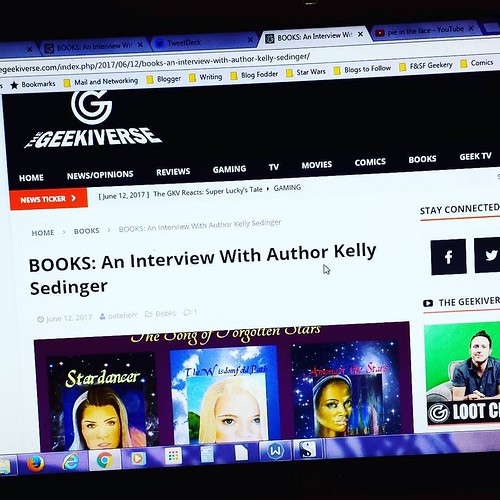
I was interviewed at The Geekiverse, on all manner of writerly and authorly things! Go check it out! (The Geekiverse is a nifty site, based in Buffalo, devoted to all manner of, well, geeky stuff.)
Saturday, June 10, 2017
Symphony Saturday
I'm still trying to get ahead on writing my Mahler posts -- there's a lot of work involved in listening to Mahler -- so meantime, here's Maestro Mozart and his Symphony no. 41 in C, the "Jupiter".
Friday, June 09, 2017
Thursday, June 08, 2017
Something for Thursday
EDIT: So I'm sitting up last night and I suddenly realize it's Thursday and I hadn't posted anything. What I had forgotten is that I had previously written and scheduled a Thursday thing last week, which is something I do infrequently enough that I completely forgot that I had done it.
I promise I am not losing my mind.
(But if I am, I can declare my bid for the United States Senate!)
Yipes! It's Thursday! Folks, I've spent a big chunk of this week all screwed up as to what day it is. That happens sometimes, huh? I hope it does...anyway, here's a great song from one of my favorite acts, Blackmore's Night. Fronted by Ritchie Blackmore (of Deep Purple fame) and singer Candice Night, Blackmore's Night is a quite wonderful folk-rock group that plays the kind of music you'd want to hear on a warm summer night after a day of hanging around your local Renaissance Festival. This song is "Under a Violet Moon".
I promise I am not losing my mind.
(But if I am, I can declare my bid for the United States Senate!)
Yipes! It's Thursday! Folks, I've spent a big chunk of this week all screwed up as to what day it is. That happens sometimes, huh? I hope it does...anyway, here's a great song from one of my favorite acts, Blackmore's Night. Fronted by Ritchie Blackmore (of Deep Purple fame) and singer Candice Night, Blackmore's Night is a quite wonderful folk-rock group that plays the kind of music you'd want to hear on a warm summer night after a day of hanging around your local Renaissance Festival. This song is "Under a Violet Moon".
Tuesday, June 06, 2017
Tone Poem Tuesday
Today is the anniversary of D-Day. In their honor, here is John Williams's Hymn to the Fallen.
Friday, June 02, 2017
Bad Joke Friday
Via Roger (and I'm not sure this is actually a "bad" joke...it's kinda clever, actually....):
What's the difference between a stepstool and a 3D printer?
The former is a ladder and the latter is a former!
What's the difference between a stepstool and a 3D printer?
The former is a ladder and the latter is a former!
Thursday, June 01, 2017
Something for Thursday
I was watching a clip from the movie Gigi the other day, and this video was suggested as a follow-up. It's from a teevee show that aired in 1961. Hard to believe that this was almost sixty years ago.






